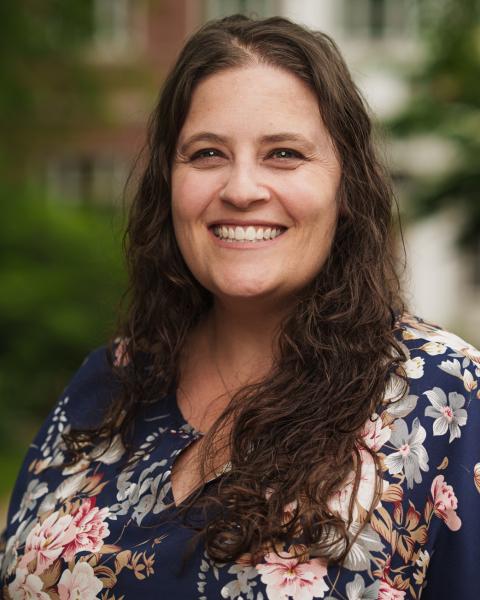Early Childhood Language Development
Early childhood is an age where children are learning at a rapid pace! In the blink of an eye our children go from infants in need of support with nearly everything, to preschoolers with their own sense of autonomy and independence. There are many areas of development happening with our young children from gross motor skills to speech and language. When entering kindergarten, many parents are unsure of where their children should be with various aspects of development and when to seek additional support. When a child is having difficulty with gross motor skills, it may be seemingly easier for a parent to identify the need for support. However, in areas of speech and language many parents have identified that the need for support can be harder to recognize.
Our UNH Extension team interviewed a Speech Language Pathologist who specializes in early childhood to answer the questions many parents have been asking. Emily Leavitt Creteau, who is licensed in Maine and holds a Certificate of Clinical Competence from the American Speech, Language, and Hearing Association, provides services to students with a variety of needs related to speech, language development and literacy.
A: This is such a tough question because there is such a wide range of "normal." I always like to encourage parents to trust their feelings and seek a professional to talk to if they have concerns. Some language and literacy skills that your 4- 5-year-old should be developing prior to entering kindergarten include:
- Asking and answering questions that start with "who", "what", "when", "where", and "why"
- Following directions with concepts like "on", "under", "in", and "out"
- Pointing and labeling body parts
- Counting groups of objects up to 10
- Talking in full sentences
- Using speech that can be understood at least 75% of the time
- Telling or telling back stories
- Recognizing their name in print
- Pretending to read books or following along while you read to them
- Knowing and reciting nursery rhymes or singing songs with rhymes
A: By kindergarten children should be speaking in complete sentences and be understood at least 75% of the time. They can tell stories about themselves and events in their day as well as tell back stories they have been told. At this age children should use language for lots of uses including to describe things, ask questions, answer questions, share their emotions, and tell where things are. We would expect to be able to have a conversation that lasts a couple of back-and-forth turns at this age as well.
A: Any sequence of sounds that the child is using as a label consistently, independently, and in a meaningful way counts as a word. For example, if a child says "choo choo" every time they see a train that would count as a word. Words children use like "uh no!", "wwweeeee!", and "yuck" also count as words if they are used spontaneously.
A: Baby talk is great to use with babies and young toddlers. By the time your child is reaching preschool age however, you want to use more natural adult talk. This helps your child develop more complex language skills in order to understand and use longer sentences.
A: The answers to both of these is a definitive "NO!" This has been a longstanding myth in our country but research has fully supported that learning another language (spoken or signed) does not delay their language development. Some research shows it to even be very beneficial.
A: By kindergarten children should be articulating, or correctly pronouncing, most sounds accurately and be understood at least 75% of the time by people who aren't very familiar with the child. The latest developing sounds are S, R, L, and Th. These should be mastered by age 6, however, so if those errors persist you can talk to your pediatrician or speech language pathologist.
A: While language skills are developing, errors with pronouns and verbs are fairly common. By the time children are entering kindergarten these errors should be limited though. If you notice pronouns are tricky for your child, you can do a couple of things. Using gestures is an effective method for emphasizing pronouns. Direct attention to yourself while saying "I" or "my" by pointing to your chest. Assist your child in patting their chest to indicate "me" or "my." When observing others, point and talk about their actions. You can also help by demonstrating correct pronoun usage in your speech. While talking with infants, it's common to say things like "Mommy will get it" however, once your child starts speaking, try to use pronouns accurately and say "I will get it." Photos of your child and family as well as books serve as valuable resources for teaching pronouns. You can narrate the actions of others, emphasizing pronouns along the way. Similar strategies to these can be used if your child is having trouble with verb tenses, saying "I hided the egg" instead of "I hid the egg." These types of errors should again be pretty infrequent by the time the child is kindergarten age.
A: This could be an example of developmental stuttering which is present in as many as 90% of children as their speech and language skills are rapidly developing. You might notice your child adding a sound or word like "ummm", repeating words or phrases, changing words in a sentence, not finishing a thought, repeating parts of words, dragging out sounds (SSSSSStop please), or pausing in the middle of a sentence. This type of dysfluency can last up to 6 months. If it lasts longer than that you should speak to your pediatrician or speech language pathologist.
- A: Read out loud daily or listen to audiobooks together in the car. Pause and ask your kids questions during reading. Narrate your thoughts about the book at times; for example, "Oh no! Jack fell down the hill, I wonder if he is OK!." Talk about the character's feelings and make predictions as well.
- A: Let your children see you reading. Fifty-seven percent of kids who are frequent readers have parents who read books 5-7 days a week compared to only 15% of kids whose parents are infrequent readers.
- A: So many language and literacy skills can be learned through fun activities like singing and playing games. "I spy" is such a great one to play in the car, it's a boredom buster and can develop skills like listening, rhyming, and talking. You could play around with rhyming words this way, "I see something that rhymes with word" (bird), letter sounds, "I see something that starts with /k/" (car), or concepts like colors, "I see something blue." One of my favorite songs to sing with children round age 4 or 5 is "Down By the Bay" because it targets rhyming skills and is super silly.
A: There are so many! Some of my favorite songs and nursery rhymes are:
- Down by the Bay
- Wheels on the Bus
- Old MacDonald Had a Farm
- Head, Shoulders, Knees and Toes
- If You're Happy and You Know It
- 5 Little Monkeys
- Ten in the Bed
A: Talking to your pediatrician is a great place to start. It is often helpful to write down your observations and concerns prior to the meeting so you don't get flustered or feel rushed. Pediatricians know of so many resources in the community such as early childhood educators, speech language pathologists, occupational therapists etc. that they can refer you to. Reaching out to the early intervention program in your state is also a step you could take if you are concerned about your child's kindergarten readiness.
You can learn more about speech and language development milestones here:
https://www.nidcd.nih.gov/health/speech-and-language
You can find local family centered and early supports in this directory:
https://nhfv.org/resources/nhdhhs-family-centered-early-supports-and-services/
Check Out Our New Health & Well-Being Page
Our specialists help create healthy people and healthy places in New Hampshire.
Featured LINK
Mental Health Resources for New Hampshire - a printable county-specific guide to help New Hampshire residents find local, state, and national mental health resources.


